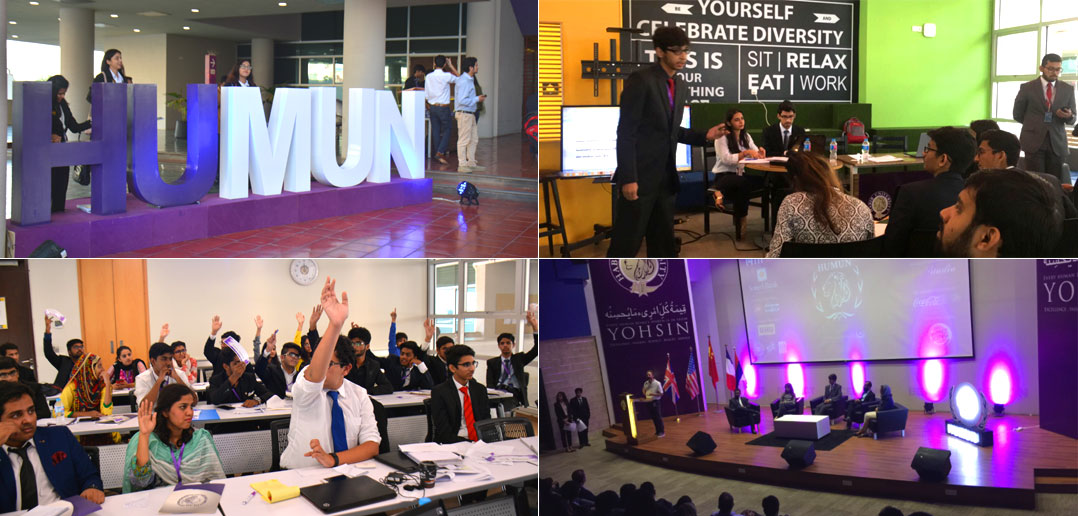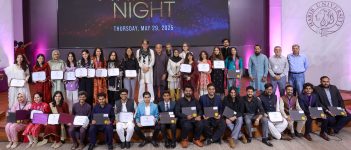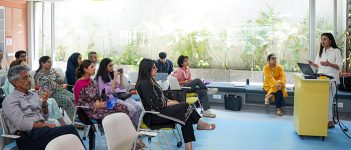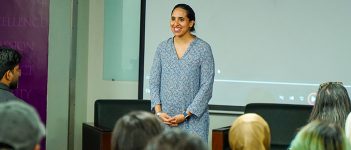Habib University Model United Nations (HUMUN) held over four days last weekend was not only the university’s first, but the first of its kind in many ways.
It is the first national MUN to have joined hands with the United Nations itself, as well as collaborated with Lahore University of Management Sciences Model United Nations (LUMUN), which is the country’s most celebrated MUN, a popular platform for research and debate to address critical global issues.
The fully student organized event opened with a welcome address by Dr. Craig Phelan, Dean of the School of Arts, Humanities, and Social Sciences at Habib University, who mentioned how “events like this are critical to increase global political awareness”, especially for young adults at university level.
It is a great idea to progressively debate about social, geo-political, and economic issues.
”
#HUMUN Pakistan’s ambassador to Libya, sharing his experience on IR #CelebratingDiversity #ResolvingDifferences pic.twitter.com/aAtKbXxkIa
— Syed Ali Arshad (@AlyCyed) October 26, 2017
Chief Guest Jamil Ahmed Khan, former Ambassador of Pakistan in the UAE, furthered Dr Phelan’s sentiment by “commend[ing]HU for hosting such events where the youth get a first-hand experience of what it’s like to debate in international grounds”, especially in a university setting where “critical thinking skills, analytical skills, are an important part of such debates”. He was pleased to see the number of delegates interested in pursuing this respective field especially since it instigated the idea of “joining hands to attain sustainability goals”.
”
#HUMUN SecGen, Nisa Khurram addressing about Islamophobia #ResolvingDifferences pic.twitter.com/74Ml3nBUmT
— Syed Ali Arshad (@AlyCyed) October 26, 2017
HU students Nisa Khurram (Secretary General, HUMUN), and Shahzaib Alam (President, HUMUN), officially opened the event to about 300 delegates from different institutions across Pakistan.
”
Delegate of Nestle speaking about how CPEC would increase business in Pakistan #HUMUN #CPEC #CelebratingDiversity @HabibUniversity pic.twitter.com/l83t8Frtse
— HUMUN (@HABIB_MUN) October 27, 2017
Two new committees were introduced by HUMUN- CPEC (China Pakistan Economic Corridor) addressed issues pertinent to the Pakistani economy, especially since the China-Pakistan relationship is changing the Pakistani industry, economy, and even education system. Delegates asserted that “Paying close attention to issues that may come up during the Chinese endorsement of Pakistan is of utmost importance to the future generations.”
”
Quaid e Azam: “There no point in discussing further what the British did or did not. The point is to move on” #HUMUN #SDSC @HabibUniversity pic.twitter.com/tONjsD3zTm
— HUMUN (@HABIB_MUN) October 27, 2017
SDCS (Special Decolonization Committee on the Subcontinent) raised debate about the history of the Subcontinent and the creation of Pakistan – a topic of deep importance in Habib University’s teaching and also spoken about at its annual Post-Colonial Higher Education Conference (PHEC). Muhammad Jibran Nasir interacted with members of the SDCS Committee to dissect the origins of Pakistan. As a politician, he emphasized the need for diversity and tolerance between the citizens of both Pakistan and India. The purpose of the committee was to delve into Pakistan’s history and develop a deeper understanding of partition from the perspective of political leaders of the time.
The four-day conference invited many notable personalities to the University campus, such as Kami Sid and Muhammad Jibran Nasir. The speakers were invited as part of HUMUN ideology of acceptance across spectrums and the celebration of diversity. In discussions with students, Kami Sid addressed issues being faced in the LGBTQ community in Pakistan, stating “rights will be given when you talk to the right people at the right time”.
”
“If you are together, you will be able to fight better” Kami Sid #HUMUN #CelebratingDiversity #ResolvingDifference @HabibUniversity pic.twitter.com/NiY8paCy4L
— HUMUN (@HABIB_MUN) October 27, 2017
The entirely student organized event touched upon topics the debate circle has yet to explore, such as recreation of human intelligence as artificial intelligence, big data and its effects on the world, and the power of cartography.
”
Had a wonderful evening at the beautiful campus of #HabibUniversity in an interactive session with the students at ModelUN closingceremony. pic.twitter.com/mHkm6xeuUi
— Nafisa Shah (@ShahNafisa) October 29, 2017
Nafeesa Shah from the National Assembly of Pakistan congratulated the HUMUN team for hosting a successful event. She was followed by a LUMUN representative who also congratulated Habib University and was thrilled LUMUN decided to join hands with the institute- “we as LUMUN are committed to make sure that Habib University develops in a very sound Model united nation forum. […] It’s due to professionalism and passion of HUMUN which ensures that this conference was a success”. On an end note, HUMUN patron Gulraiz Khan acknowledged the student effort put into the event:
Habib is a very young institution, we have our first batch to graduate,
first MUN, an event led completely by students, and last night I felt like
Habib has grown and students can take charge.




